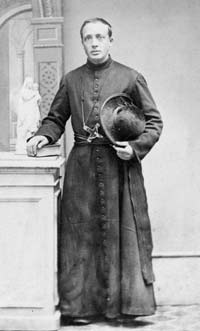Born at Bonnieux (Vaucluse), May 25, 1831.
Taking of the habit at Notre-Dame de l’Osier, October 22, 1850.
Oblation at Notre-Dame de l’Osier, October 30, 1851. (no. 314)
Ordination to the priesthood at Marseilles, June 24, 1855.
Died at Marseilles, February 21, 1916.

François Xavier Bonnefoi (GA).
François-Xavier Bonnefoi was born at Bonnieux in the diocese of Avignon, May 25, 1831. After one year of philosophy at the major seminary of Avignon, he entered the novitiate of Notre-Dame de l’Osier on October 22, 1850 and it was there that he made his oblation on October 30, 1851. He had been admitted to vows in the October 5, 1851 session of the General Council. The Register of the council reports stated this about him: “Gentle in character and even a bit soft, but has a prayer life, is regular in observance, docile, deep love of his vocation, possesses more than the ordinary talents, has a natural aptitude for preaching.”
He studied theology at the major seminary of Marseilles from 1851 to 1855 before being ordained to the priesthood by Bishop de Mazenod on June 24, 1855. In the Registry of the reports on Oblates (1853-1867) the moderator of scholastics mentions François Xavier Bennefoi’s rather fragile health, but especially emphasizes his qualities and his virtues: “a model of exact observance of the Rule; very good relations with all his confreres; excellent conduct in every respect, especially outstanding for his charity and his meticulousness in the smallest details, etc.”
During his life, Father Bonnefoi preached constantly, especially in the Midi. Initially, he worked at Notre-Dame de Lumières from 1855 to 1858 where Father Telmon was anxious to have him because Father Bonnefoi could preach in Provençal. He was stationed at Notre-Dame de Sion in 1859-1860, at Notre-Dame de l’Osier in 1860-1861, at Autun in 1860-1861, then once again at Notre-Dame de Lumières from 1862 to 1870, initially as a mission preacher, then as director of the juniorate from 1867 to 1870. We find him at Notre-Dame de Bon Secours from 1871 to 1875 and at Le Calvaire in Marseilles until the expulsions of 1880. He was superior at Notre-Dame de Lumières from 1882 to 1886 and at Notre-Dame de l’Osier from 1887 to 1889. From 1889 to 1901 he lived at Le Calvaire where he was superior from 1899 to 1901. On January 1, 1902, he was sent to Notre-Dame de la Garde. In the review, Missions O.M.I., Father Bessières, the superior of the community, wrote: “On New Year’s Day, January 1, 1902. Rev. Fr. Provincial made us the gift of the worthy Father Bonnefoi who, upon leaving Le Calvaire, was supposed to find in the shadow of our prayerful sanctuary a well earned rest. Alas! Novitiates are hard on men who do not have vocations. Father Bonnefoi will never be a professed member of the lazy set. He remained the ordinary confessor of the Sisters of Hope, the extraordinary confessor of the Sisters of the Visitation, the Mimimesses, the sisters of Saint Charles, of the Holy Name of Jesus, of Saint Joseph. He preached a Lenten series in the parish church of Montolivet, a retreat to the congregation of Saint Anne at Auriol, a special occasion sermon at the Visitation, a retreat at the Magdalenes of the Refuge, the annual retreat to the sisters of Saint Charles at Avignon. He delivered an ardent, prayerful address in the basilica to the pilgrims of Crottes. Like his glorious patron saint, Saint Francis Xavier, he answered the call to work by responding: amplius, Domine, amplius. [More, Lord, more]”
In 1903, the Oblates were expelled from the Oblate house and the sanctuary of Notre-Dame de la Garde and were compelled to scatter. Father Bonnefoi remained behind with friends in Marseilles where he died on February 21, 1916. Afterwards, Abbé Castet wrote a page about him in theSemaine religieuse de Marseille. Among other things, we read: “His spiritual action was visibly blessed by God during the course of the many works of his apostolic life. The enthusiasm of his fiery speach and especially the influence of his so very edifying life were the cause of many conversions. For a half century the regions of the Dauphiné, the Savoy, the Languedoc, Provence and especially Marseilles benefited from his zeal. […] A man of great good common sense and of enlightened judgment, people consulted him with great benefit even concerning temporal matters and, if the years slowed his walk and reduced his physical vigour, it in no way attenuated the acumen of his intellect, a lucidity he enjoyed until the very end…”
Yvon Beaudoin, o.m.i.
